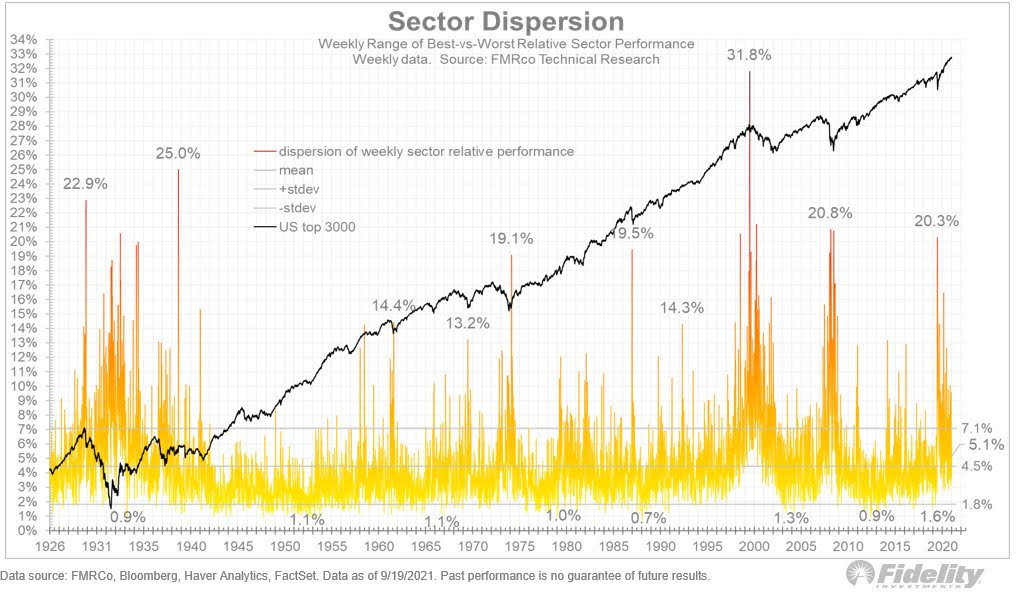My end of week morning train WFH reads:
• Americans Have No Idea What the Supply Chain Really Is Much of the country’s pandemic response has treated us as somehow separate from the rest of the world and the challenges it endures, but unpredictably empty shelves, rising prices, and long waits are just more proof of how foolish that belief has always been. (The Atlantic) see also How A Single Missing Part Can Hold Up $5 Million Machines And Unleash Industrial Hell “You’ve got 99 of the 100 parts you need, and you have work-in-process that’s stuck,” says Tim Fiore, who conducts a monthly survey of factory managers for the Institute for Supply Management. (NPR)
• Benjamin Graham vs. Jesse Livermore Benjamin Graham and Jesse Livermore are two of the most well-known investors in history. Investors and traders alike still liberally quote Graham and Livermore on a regular basis despite the fact that both made their bones investing in the early part of the 20th century. If we do a tale of the tape, you’ll notice many differences between these two legends. (Wealth of Common Sense)
• Investors Bet Environmental Fears Will Crunch Commodity Supply, Lifting Prices Wagers on environmentally driven supply shortages are pushing up everything from natural gas to aluminum, increasing costs for consumers and businesses (Wall Street Journal)
• A failed economic theory of everything For a brief moment, some economists thought they had it all figured out. They didn’t. Ten years ago, when the U.S. was trying to figure out how to pull itself out of the slump created by the Great Recession, battles over ideas like Real Business Cycle Theory and New Keynesian models were fierce, urgent, and relevant. Now, macro is way down the list of anything anyone cares about. (Noahpinion)
• Despite Covid, German companies aren’t going bust Besides the glaringly obvious one and a few long-troubled high street retailers, hardly any companies in Germany have gone bust during the pandemic. “At the moment the companies that are in insolvency are either the ones that are in super desperate situations or where an insolvency is used to implement a pre-packaged restructuring plan.” (Financial Times)
• Microsoft and an Army of Tiny Telecoms Are Part of a Plan to Wire Rural America With help from Washington, the 120 million Americans without high-speed internet access have their best shot in a generation at getting it—so long as they’re flexible on how. (Businessweek)
• Huge hack reveals embarrassing details of who’s behind Proud Boys and other far-right websites “It’s massive. It may be the biggest domain-style leak I’ve seen and, as an extremism researcher, it’s certainly the most interesting,” said Megan Squire, a computer science professor at Elon University who studies right-wing extremism. “It’s an embarrassment of riches — stress on the embarrassment.” Researchers say it will allow them to gain important new insights into how extremists operate online. (Washington Post)
• Beyond Happiness: Why a Psychologically Rich Life Is a Good Life What we get from psychological richness that happiness does not provide. (Psychology Today) see also Steven Pinker Thinks Your Sense of Imminent Doom Is Wrong In our uncertain age, which can so often feel so dark and disturbing, Steven Pinker has distinguished himself as a voice of positivity. This has elevated the Harvard cognitive psychologist beyond academia and into the realm of the public intellectual. (New York Times)
• What California’s Recall Election Can — And Can’t — Tell Us About The 2022 Midterms One thing we do know is that turnout was really high: More than 13 million people voted. That means more than 50% of California’s 26 million eligible voters cast a ballot — a remarkably high turnout rate for an off-year election. In fact, it’s higher than the 49 percent turnout in California’s regularly scheduled 2018 gubernatorial election, which was a historically high-turnout midterm. (FiveThirtyEight)
• How I Went From Prison Cook to Pizza Chef at One of Philly’s Best New Restaurants At Down North Pizza in Philadelphia, all the employees are formerly incarcerated, including executive chef Michael Carter. This is his story. (Bon Appetit)
Be sure to check out our Masters in Business interview this weekend with Hubert Joly, former Chairman Chief Executive Officer of Best Buy, who turned the company around, returning them to profitability and a 10X stock run in the face of competition from Amazon. He has been named a Top 100 CEOs by Harvard Business Review, and 10 CEOs in the U.S. by Glassdoor. He is the author of a new book “The Heart of Business: Leadership Principles for the Next Era of Capitalism.”
Sector Returns, Market Corrections, and Dispersion

Source: @TimmerFidelity
Sign up for our reads-only mailing list here.

